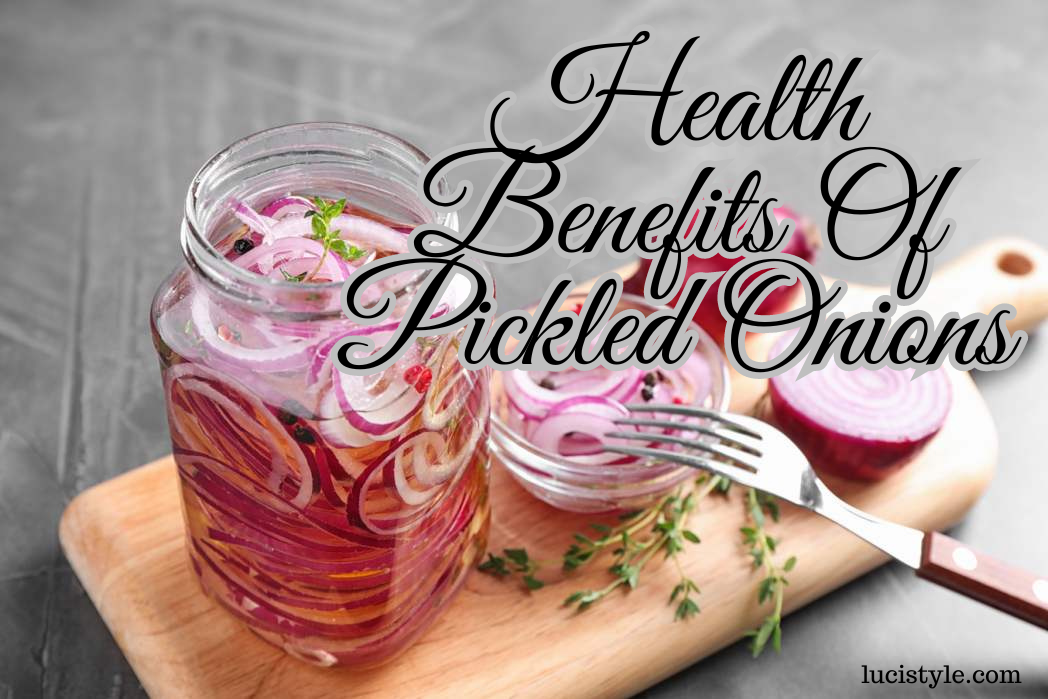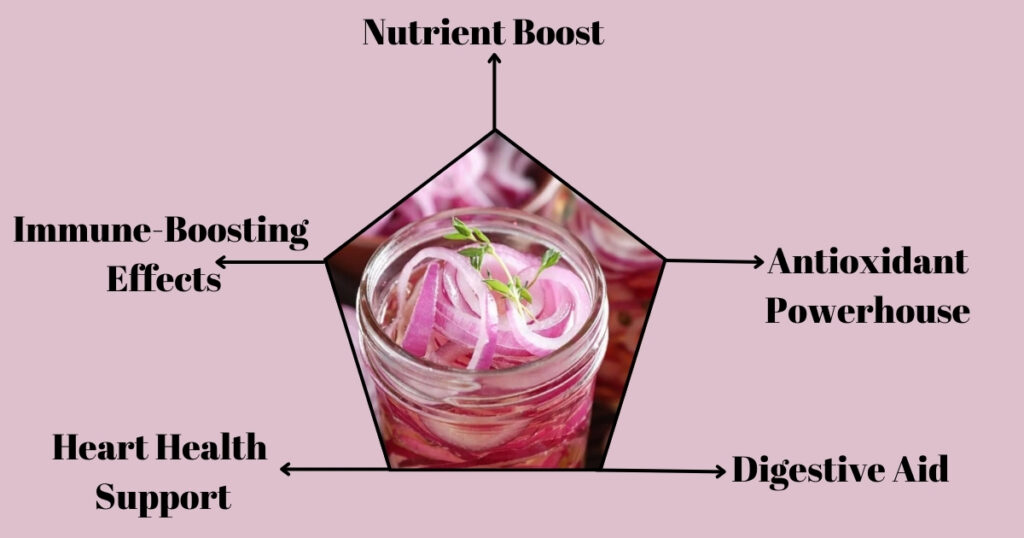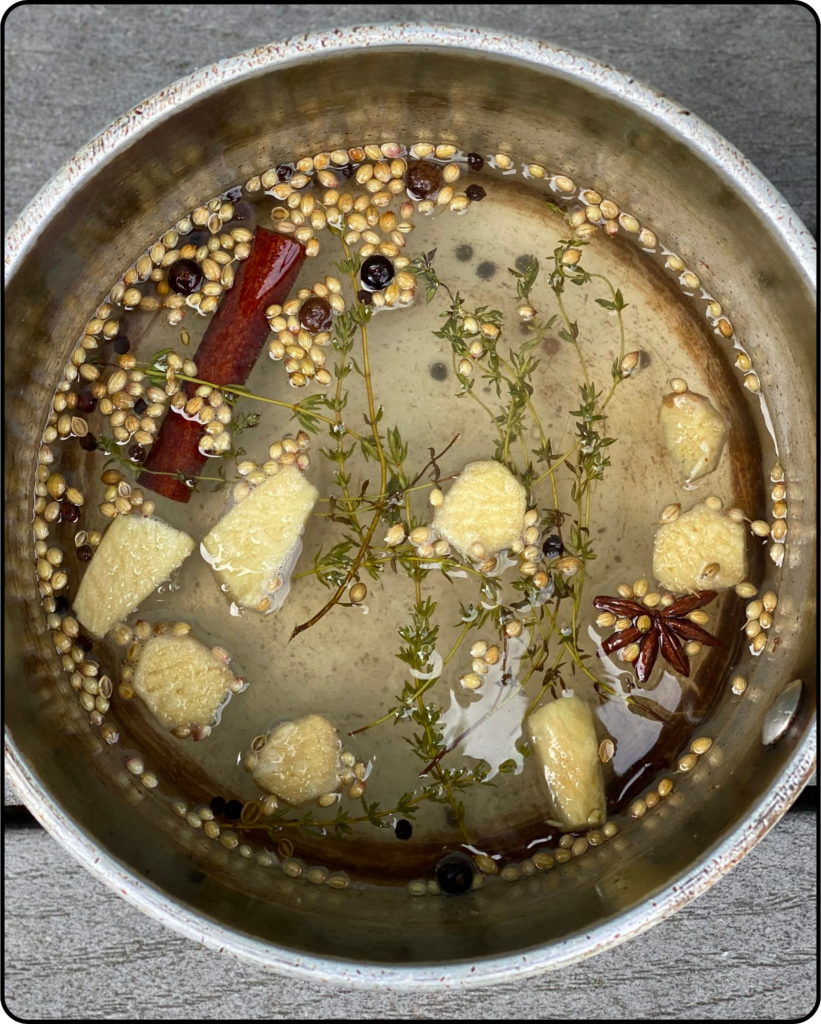Pickled Onions’ Health Benefits That You Should Know

Pickled onions have become a popular addition to meals, adding a tangy and flavorful punch to various dishes. But did you know that pickled onions also offer numerous pickled onions’ health benefits? From their antioxidant properties to potential immune-boosting effects, pickled onions are more than just a tasty condiment. In this comprehensive guide, we will explore the pickled onions’ health benefits and provide you with step-by-step instructions on how to pickle onions at home.
Pickled onions, known for their vibrant colours and deliciously tart taste, have long been enjoyed as a condiment in many cuisines around the world. However, beyond their culinary appeal, pickled onions offer a range of pickled onions’ health benefits that make them a valuable addition to your diet. These tangy treats are rich in antioxidants, which help combat free radicals and protect your cells from oxidative damage. Additionally, pickled onions are a great source of essential vitamins and minerals, including vitamin C, vitamin B6, and potassium.
Incorporating pickled onions into your meals can provide a flavorful boost while also boosting your nutrient intake. So, whether you’re a fan of the classic pickled red onions or prefer the milder taste of pickled white onions, you can enjoy their pickled onions’ health benefits with every bite.

Table of Contents
The Pickled Onion’s Health Benefits: Unveiling the Tangy Superfood
Pickled onions have been a beloved condiment for centuries, adding a burst of tangy flavor to dishes around the world. But did you know that pickled onions offer more than just a delightful taste? These vibrant and zesty onions are packed with pickled onions’ health benefits.
From their antioxidant properties to potential immune-boosting effects, pickled onions have gained recognition as a tangy superfood. In this section, we will explore the various pickled onions’ health benefits and how they can contribute to your overall well-being.
Antioxidant Powerhouse
Pickled onions are rich in antioxidants, such as quercetin and anthocyanins, which help neutralize harmful free radicals in the body. These antioxidants protect your cells from oxidative damage, reducing the risk of chronic diseases like heart disease and certain types of cancer. By incorporating pickled onions into your meals, you can boost your antioxidant intake and promote better health.
Immune-Boosting Effects
The immune system plays a vital role in defending your body against infections and illnesses. Pickled onions contain nutrients like vitamin C and phytochemicals, which are known to strengthen the immune system. A robust immune system helps fight off pathogens and reduces the likelihood of falling ill. Adding pickled onions to your diet can provide a natural boost to your immune system.

Heart Health Support
Maintaining a healthy heart is crucial for overall well-being. Pickled onions have been associated with heart health benefits-pickled onions’ health benefits due to their flavonoid content. Flavonoids have been shown to reduce the risk of heart disease by improving blood vessel function and reducing inflammation. By including pickled onions in your meals, you can contribute to a healthier cardiovascular system.
Digestive Aid
The fermentation process involved in pickling onions results in the production of probiotics. These beneficial bacteria support a healthy gut microbiome, aiding digestion and improving nutrient absorption. Consuming pickled onions can help promote a balanced digestive system and alleviate digestive issues.
Nutrient Boost
In addition to their health benefits, pickled onions are also a good source of essential nutrients. They provide vitamins and minerals like vitamin C, vitamin B6, potassium, and fiber. These nutrients are important for various bodily functions, including immune support, nerve function, and maintaining healthy blood pressure.

By incorporating pickled onions into your diet, you can enjoy their tangy flavour while reaping their numerous health benefits.
Whether you prefer pickled red onions, pickled white onions, or other variations, these zesty delights can be a flavorful and nutritious addition to your meals. So, let’s dive deeper into the step-by-step process of pickling onions at home and unlock the full potential of this versatile superfood.
How to make Pickled Onions
Preparation
Selecting the Onions
When it comes to pickling onions and reaping pickled onions’ health benefits, it’s essential to choose onions that are not only flavorful but also packed with essential nutrients. Opt for fresh onions with a firm texture and thin, papery skin. While red onions are commonly used for pickling due to their mild and slightly sweet flavor, you can also experiment with white or yellow onions. Regardless of the color, prioritize onions that are uniform in size for consistent pickling results and optimum pickled onion nutrition.

Peeling and Slicing the Onions
Once you have selected the onions, it’s time to prepare them for pickling while preserving their nutritional value. Begin by removing the outer layer of skin and any blemishes. Then, using a sharp knife, proceed to slice the onions into thin and uniform slices. Aim for slices that are approximately 1/8 to 1/4 inch thick. This thickness allows the pickling liquid to penetrate the onions, ensuring that the pickled onions retain their nutritional benefits and flavor.

Preparing the Pickling Liquid
The pickling liquid not only lends flavor to the onions but also plays a role in preserving their nutritional content. In a saucepan, combine equal parts vinegar and water. You can choose from options such as distilled white vinegar or apple cider vinegar, or even experiment with different vinegars to enhance the taste. To balance the flavors, add sugar and salt to taste. Feel free to incorporate additional spices or herbs for added depth and variety. Bring the mixture to a boil, stirring until the sugar and salt completely dissolve. Once done, remove the pickling liquid from heat and allow it to cool before proceeding with the pickling process.

By following these preparation steps, you can ensure that your pickled onions not only satisfy your taste buds but also provide valuable pickled onion nutrition. Remember to select fresh and high-quality onions, slice them uniformly, and prepare a flavorful pickling liquid. With the onions prepared, let’s move on to the next step: the pickling process itself.
Pickling Process
Sterilizing the Jars
Before you begin the pickling process, it’s crucial to sterilize the jars to ensure the preservation of the pickled onions and maintain their quality. Begin by thoroughly cleaning the jars and their lids using hot, soapy water. Rinse them thoroughly and place them in a spacious pot filled with water. Bring the water to a boiling point and allow the jars to simmer for approximately 10 minutes. This step helps eliminate any potential bacteria or contaminants that could affect the pickled onion’s nutrition and overall safety.

Layering the Onions in the Jars: Once the jars are sterilized and cooled, it’s time to layer the onions inside. Arrange the peeled and sliced onions snugly within the jars, ensuring there is a small gap at the top for expansion. You can use a spoon or your hands to press them down gently to ensure they fit snugly. This step ensures that the pickling liquid can fully penetrate the onions, enhancing the pickled onion’s nutrition and flavor.
Pouring the Pickling Liquid
Now it’s time to prepare the pickling liquid. In a saucepan, combine vinegar, water, sugar, salt, and any additional spices or flavorings you desire. Heat the mixture until it reaches a boiling point, stirring continuously until the sugar and salt completely dissolve. Once the liquid is ready, carefully pour it into the jars over the onions, ensuring that all the onions are fully submerged. The pickling liquid not only adds flavor but also contributes to the pickled onion nutrition, as it infuses the onions with beneficial nutrients and compounds.
Sealing the Jars
After pouring the pickling liquid, it’s important to properly seal the jars to create an airtight environment for the fermentation process. Cleanse the edges of the jars using a fresh, moist cloth to eliminate any remnants. Securely affix the lids onto the jars and ensure they are tightly fastened. Avoid over-tightening, as this can hinder the release of gases during fermentation. This step helps preserve the pickled onion nutrition and maintain the quality of the pickled onions throughout their storage period.
By following these steps, you can achieve perfectly pickled onions that not only offer a delightful crunch and tangy flavor but also provide valuable pickled onion nutrition. Now that you have completed the pickling process, it’s time to allow the onions to ferment and develop their tangy goodness. Place the tightly sealed jars in a cool and dim location for a minimum of seven days to allow the flavors to mature. The longer you let them ferment, the more pronounced the taste will be. Once they have reached your desired level of tanginess, move the jars to the refrigerator for long-term storage. Enjoy your homemade pickled onions, knowing that you are also benefiting from their nutritious qualities!

Fermentation and Storage
- Allowing the onions to ferment: After layering the onions in the jars and pouring the pickling liquid, it’s time to let the magic happen through the process of fermentation. As the onions ferment, they undergo a transformation that not only enhances their flavor but also boosts pickled onions’ health benefits. The fermentation process increases the probiotic content of pickled onions, promoting a healthy gut and aiding digestion. These beneficial bacteria contribute to improved nutrient absorption and support a balanced digestive system. So, by allowing the onions to ferment, you’re not only creating a tangy condiment but also unlocking the potential pickled onions’ health benefits.
- Storing the pickled onions properly: Once the fermentation process is complete and you’re satisfied with the flavor, it’s important to store the pickled onions properly to maintain their quality and preserve their health benefits. Remove any excess air from the jars by pressing down on the onions and ensuring they are fully submerged in the pickling liquid. This prevents oxidation and helps retain the vibrant color and antioxidants of the onions. Secure the lids firmly and place the jars in the refrigerator for storage. By storing the pickled onions in a cool environment, you can maintain their nutritional value and extend their shelf life. Enjoy the pickled onions within a few months to fully experience their tangy flavor and reap the pickled onions’ health benefits they offer.
By allowing the onions to undergo fermentation and storing them properly, you not only enhance their taste but also maximize the pickled onions’ health benefits. The fermentation process increases the probiotics, supporting gut health and digestion, while proper storage ensures the retention of vital nutrients and antioxidants. So, be sure to follow these steps to fully enjoy the tangy and nutritious goodness of pickled onions.
Conclusion
In conclusion, pickled onions are not just a delicious and tangy condiment, but they also offer a multitude of health benefits. By incorporating pickled onions into your diet, you can enjoy their unique flavor while reaping the nutritional advantages they provide. From their antioxidant properties to potential immune-boosting effects, pickled onions can be a valuable addition to your meals.
The pickled onions’ health benefits stem from their rich antioxidant content, which helps protect your cells from oxidative damage and reduces the risk of chronic diseases. Additionally, the fermentation process involved in pickling onions increases their probiotic content, promoting a healthy gut and aiding digestion. These beneficial bacteria support nutrient absorption and contribute to a balanced digestive system.
Whether you prefer pickled red onions or pickled white onions, the process of pickling onions at home is relatively simple and allows you to customize the flavors to your liking. By following the step-by-step instructions provided in this guide, you can create your pickled onions’ health benefits and a batch of tangy offers.
Why not set off on a gastronomic journey and delve into the realm of pickled onions? Enhance your meals with their vibrant flavor and reap the rewards of their remarkable pickled onions’ health benefits. Whether you add them to sandwiches, salads, or as a tasty accompaniment to various dishes, pickled onions are a versatile and nutritious addition to your culinary repertoire. Start pickling your onions today and savor the tangy goodness while boosting your well-being.
Frequently Asked Questions
Is pickled onion juice good for you?
Pickled onion juice can offer some health benefits due to the nutrients and antioxidants present in the onions. Nevertheless, it is crucial to consume pickled onion juice in moderation due to its potential high sodium content. Nevertheless, it is crucial to enjoy it in moderation due to its potential sodium content. The pickling process may also reduce some of the nutrients found in fresh onions. It is best to enjoy pickled onion juice as part of a balanced diet rather than relying solely on it for pickled onions’ health benefits.
How to pickle onions at home?
Pickling onions are a specific type of onion that is smaller in size and has a milder flavor compared to regular onions. They are specifically grown for pickling purposes and are often sweeter and less pungent. Regular onions, on the other hand, come in various sizes and flavors and can be used in a wide range of culinary applications beyond pickling.
What happens if I eat too many pickled onions?
While pickled onions can be a healthy addition to your diet, consuming excessive amounts may lead to certain side effects. Pickled onions are high in sodium, so excessive consumption can contribute to increased blood pressure and fluid retention. Additionally, the vinegar used in the pickling process can be acidic and may cause digestive discomfort or heartburn in some individuals. It is crucial to consume pickled onions in moderation as a component of a well-balanced eating plan.
What is the process for pickling onions in a home kitchen?
Pickling onions at home is a simple process that involves peeling and slicing the onions, preparing a pickling liquid with vinegar, salt, and other desired spices or flavors, and then allowing the onions to soak in the liquid for some time. Detailed step-by-step instructions for pickling onions at home are provided in the earlier sections of this guide.
Are there any potential side effects or considerations when consuming pickled onions regularly?
While pickled onions can offer health benefits, there are some potential side effects and considerations to keep in mind. As mentioned earlier, pickled onions are high in sodium, so individuals with high blood pressure or those who need to limit their sodium intake should consume them in moderation. Additionally, the vinegar used in pickling can be acidic and may cause discomfort for individuals with digestive sensitivities or acid reflux. It is advisable to be attentive to your body’s signals and adapt your intake accordingly.
How do pickled onions compare to fresh onions in terms of health benefits?
Pickled onions and fresh onions both offer health benefits but in slightly different ways. Fresh onions are rich in nutrients like vitamin C, fiber, and various antioxidants, which can support immune function and overall health. However, the pickling process may reduce some of the nutrient content in pickled onions. On the other hand, pickled onions undergo fermentation, which increases their probiotic content, promoting a healthy gut and aiding digestion. Both fresh and pickled onions can be enjoyed as part of a balanced diet to reap their respective health benefits.
Can pickled onions improve immunity?
Pickled onions can contribute to a healthy immune system due to their antioxidant properties and the presence of nutrients like vitamin C. Antioxidants help protect cells from damage caused by harmful free radicals, thus supporting immune function. However, it is important to note that pickled onions should be consumed as part of a well-rounded diet that includes a variety of fruits, vegetables, and other nutrient-rich foods to support overall immune health.
Editor’s Choice :
Leave a Reply
You must be logged in to post a comment.